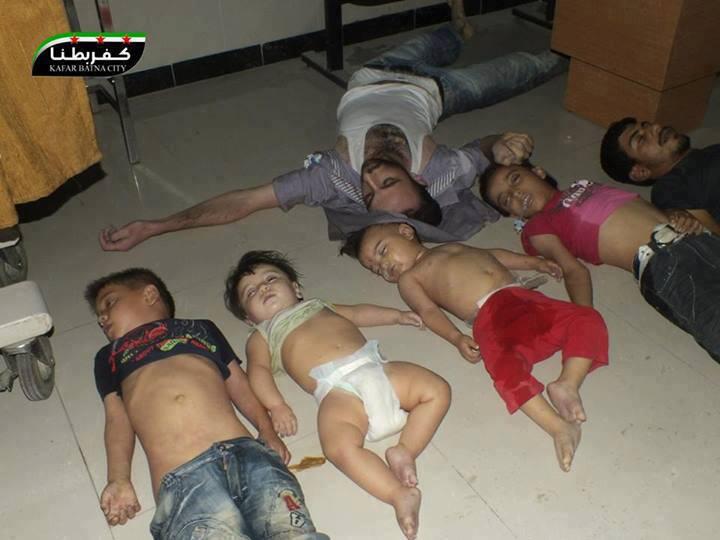All of a sudden, Bashar al-Asad has taken leave of his senses. In spite of the fact that he has been increasingly in control of the situation in Syria using only conventional weapons, he has decided to place a noose around his neck: he has provoked the West, which had set the use of chemical weapons as its red line. The source of the information about this atrocity (the use of chemical weapons) is “the rebels”. In other words, it is the other side in this conflict; the side that the West listens to as if they were a divine and impartial Oracle. And who are these rebels? It’s better to leave that question for another occasion as to answer it would require more space than I have I this article, and would not be “politically correct”. What is certain, however, is that even within the UN itself, the voices that point out that it is precisely these rebels that are using chemical weapons (such as that of Carla del Ponte, the respected Chief Prosecutor of the International Criminal Tribunal for Ruanda, who was stripped of this position by the USA and the UK) are increasingly being silenced.
As such, the “noble” West, that more than a decade ago decided to attack Iraq on account of its possession of weapons of mass destruction, once again goes into action. And, once again, a staggering chorus of analysts, experts, commentators, editors, etc. (conservatives, liberals and socialists) propagate the new consensus: we “the goodies”, “the defenders of democracy and freedom”, “have to do something”. And our Western society, a society in decline lead by criminals, doesn’t say word. It would not only seem that our society has not learnt anything from the past, but that it becomes ever more stupid and incapable of mobilisation. This is because it is not only the information technologies that in the last decade have evolved at an astonishing rate, it is also the “technologies” of propaganda and control of the masses (and, of course, those that are used for the purposes of “intelligence”). It is not surprising that, when Julian Assange was asked what his conclusions were after reading hundreds of thousands of secret cables, his first conclusion was that they have done away with civil society.
When, half a century from now, they declassify the documents that relate to all this (as they are doing at the moment with those that refer to the USA’s coup in Iran), many notable “intellectuals” (those that are still alive), won’t even see fit to offer some kind of apology – they know how to keep themselves within the bounds of political correctness and they will continue to have at their disposition the most distinguished positions and the greatest resources. We, on the other hand, will never stop being the “radicals” or even “conspiracy theorists”, in spite of the fact that some of our arguments are so difficult to disagree with, such as the revelations made in front of the television cameras by General Wesley Clark, former supreme commander of NATO forces during the attack on Kosovo. Even before the attack on Afghanistan, he revealed his own government’s secret plan: “to take over seven countries in the next few years: starting with Iraq, then Syria, Lebanon, Somalia, Libya, Sudan and finishing with Iran”. How is it possible that such testimonies don’t attract the attention of those who seek to analyse (without ever taking into consideration any external causes) the conflicts in which the West involved?
And why, these intellectuals ask, is Bashar al-Asad so reluctant to allow the UN weapons inspectors to carry out their investigations? Yet for those of us who know what such teams have been doing for more than half a century in Congo and in Rwanda (or what the UN does afterwards with the most awkward pieces of information that they produce), it comes as no surprise that the Syrian regime is so averse to them. In early 2010, Senator Pere Sampol, surprised and indignant about the conclusions of another team of UN experts, sought out an interview with the judge Fernando Andreu. In order to derail our case in Spain’s Audencia Nacional (National Court) against tens of senior officials of the Government of Rwanda, they accused me of being the principal financial backer of the “genocidal criminals” of the FDLR. I even remember the words that this principled judge pronounced that day: “these days I no longer take into account the information provided by the UN, as for years I have repeatedly seen that it comprises reports prepared at the behest of just one of the relevant parties. Later, the publication of five cables by WikiLeaks made quite clear the blatant conspiracy in which the USA’s Department of State, the Government of Rwanda, the UN, our (Spain’s) Ministry of Foreign Affairs and the newspapers El País and Público were involved. Yet even now, when even the UN itself recognises that the various rebel groups operating in DR Congo are above all caused by the actions of Rwanda itself, none of the actors in this farce have deigned to apologise either to us or, above all, to the victims in Rwanda and Congo.
